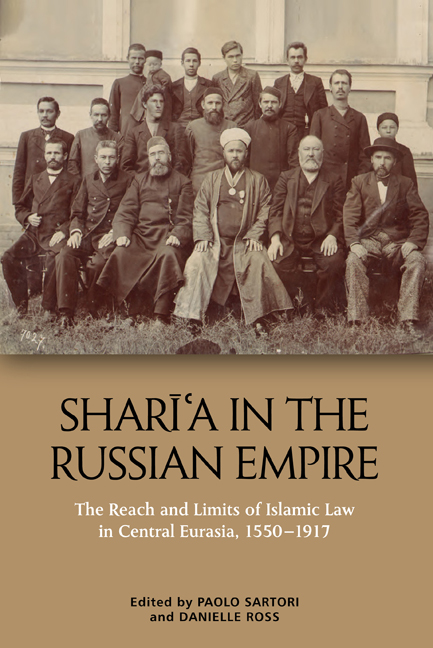Book contents
- Frontmatter
- Contents
- List of Contributors
- Introduction: The Reach and Limits of Sharīʿa in the Russian Empire, c.1552–1917
- 1 Islamic Education for All: Technological Change, Popular Literacy and the Transformation of the Volga-Ural Madrasa, 1650s–1910s
- 2 Taqlīd and Discontinuity: The Transformation of Islamic Legal Authority in the Volga-Ural Region
- 3 Debunking the ‘Unfortunate Girl’ Paradigm: Volga-Ural Muslim Women’s Knowledge Culture and its Transformation across the Long Nineteenth Century
- 4 Between Imperial Law and Islamic Law: Muslim Subjects and the Legality of Remarriage in Nineteenth-century Russia
- 5 Islamic Scholars among the Kereys of Northern Kazakhstan, 1680–1850
- 6 Tinkering with Codification in the Kazakh Steppe: ʿĀdat and Sharīʿa in the Work of Efim Osmolovskii
- 7 Taqlīd and Ijtihād over the Centuries: The Debates on Islamic Legal Theory in Daghestan, 1700s–1920s
- 8 Kunta Ḥājjī and the Stolen Horse
- 9 What We Talk about When We Talk about Taqlīd in Russian Central Asia
- 10 Take Me to Khiva: Sharīʿa as Governance in the Oasis of Khorezm (Nineteenth Century–Early Twentieth)
- Index
7 - Taqlīd and Ijtihād over the Centuries: The Debates on Islamic Legal Theory in Daghestan, 1700s–1920s
Published online by Cambridge University Press: 22 September 2020
- Frontmatter
- Contents
- List of Contributors
- Introduction: The Reach and Limits of Sharīʿa in the Russian Empire, c.1552–1917
- 1 Islamic Education for All: Technological Change, Popular Literacy and the Transformation of the Volga-Ural Madrasa, 1650s–1910s
- 2 Taqlīd and Discontinuity: The Transformation of Islamic Legal Authority in the Volga-Ural Region
- 3 Debunking the ‘Unfortunate Girl’ Paradigm: Volga-Ural Muslim Women’s Knowledge Culture and its Transformation across the Long Nineteenth Century
- 4 Between Imperial Law and Islamic Law: Muslim Subjects and the Legality of Remarriage in Nineteenth-century Russia
- 5 Islamic Scholars among the Kereys of Northern Kazakhstan, 1680–1850
- 6 Tinkering with Codification in the Kazakh Steppe: ʿĀdat and Sharīʿa in the Work of Efim Osmolovskii
- 7 Taqlīd and Ijtihād over the Centuries: The Debates on Islamic Legal Theory in Daghestan, 1700s–1920s
- 8 Kunta Ḥājjī and the Stolen Horse
- 9 What We Talk about When We Talk about Taqlīd in Russian Central Asia
- 10 Take Me to Khiva: Sharīʿa as Governance in the Oasis of Khorezm (Nineteenth Century–Early Twentieth)
- Index
Summary
Introduction
In scholarly literature, the history of the development in Daghestan of Islamic legal theory (usūl al-fiqh), in general, and the polemic on taqlīd and ijtihād, specifically, continue to receive little study. The few works that do address this topic do not fully reveal the depth of this polemic within the framework of Shāfiʿī legal tradition, which spread in Daghestan from the beginning of the eleventh century, the reasons it emerged or how it functioned from a historical perspective.
The main shortcoming of most existing works on Islamic law in Daghestan is that they do not consider the multi-layered character of ijtihād or the subtleties of discussions among the Daghestani Muslim elite concerning this topic. With rare exceptions, scholars study the problem of ijtihād without connecting it to the internal and external factors at play during the appearance and development of the ijtihād discourses. Also, there is still a tendency in Russian-language scholarship to present ijtihād as existing in opposition to taqlīd. However, as can be seen in Arabic-language Daghestani sources, ijtihād and taqlīd cannot be viewed as opposing or exclusive processes. Elements of ijtihād were never fully purged from the Shāfiʿī legal tradition. In fact, the boundary between ijtihād and taqlīd in the Daghestani written tradition is less than clear; those jurists who are described in the local tradition as supporters of taqlīd, in fact permitted the use of certain kinds of ijtihād. In other words, all the discussions of taqlīd and ijtihād in Daghestan were not based primarily upon the opposition of the two methods to each other, but, rather, focused on the permissibility of different levels of ijtihād.
These debates continued with varying degrees of intensity for several centuries and they were carried on across several historical epochs: the pre-colonial period, the colonial period and the early Soviet period. The variations in intensity of the polemic can be explained by several factors, including the outside influence of the great Islamic legal authorities of the Middle East. However, the discourses were also influenced by the internal socio-economic and political transformations of Daghestani society: the struggle of Daghestani jurists against the ascendancy of customary law (ʿadāt), the period of jihād against the Russian Empire and the Great Reforms of the second half of the nineteenth century, when Daghestan was integrated into the social and economic framework of the Russian Empire.
- Type
- Chapter
- Information
- Shari'a in the Russian EmpireThe Reach and Limits of Islamic Law in Central Eurasia, 1550-1917, pp. 239 - 280Publisher: Edinburgh University PressPrint publication year: 2020



